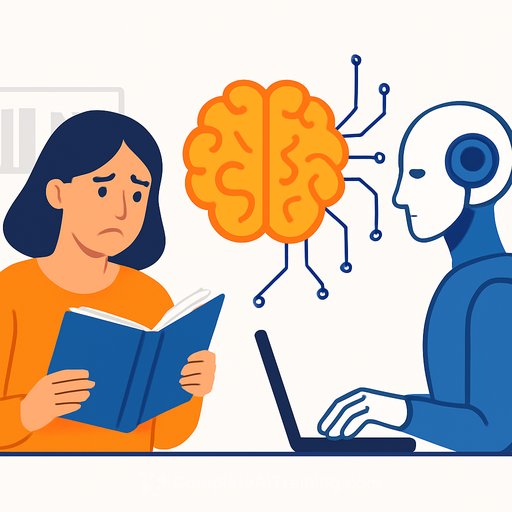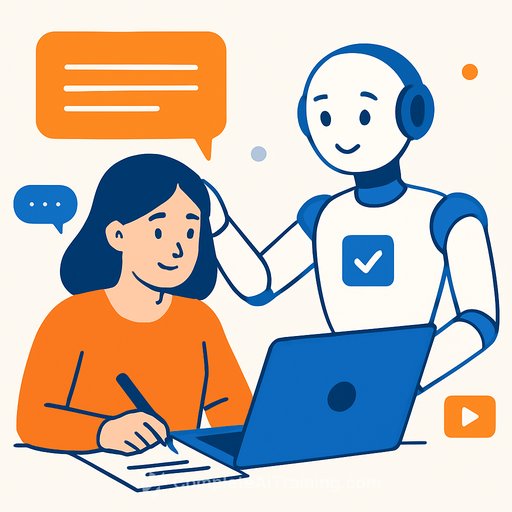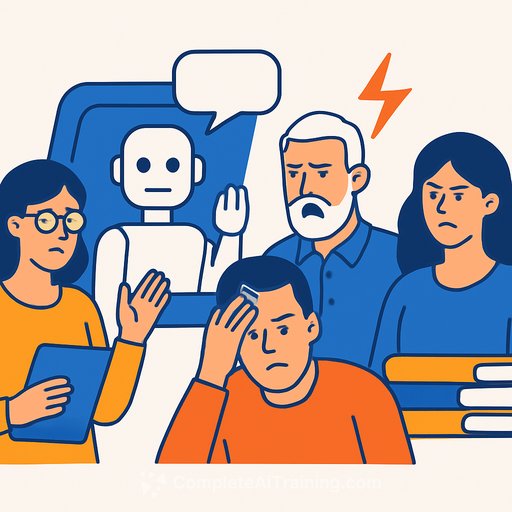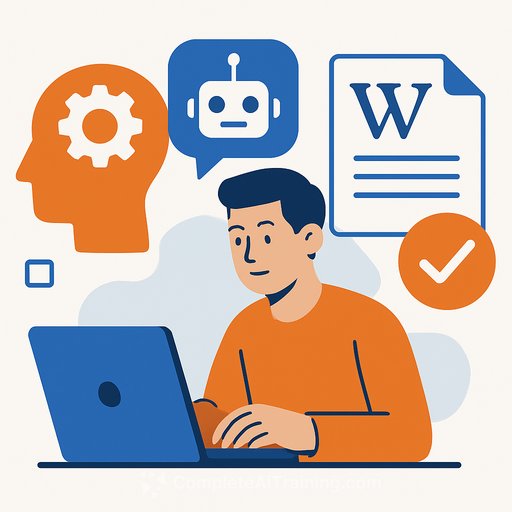UK novelists fear replacement by AI. Here's what writers need to know now
More than half of published novelists in the UK believe AI could eventually replace their work. A University of Cambridge study for the Minderoo Centre for Technology and Democracy surveyed 258 novelists and 74 industry figures. The headline: 51% of novelists expect AI to fully take over their role at some point.
Many say their books have already been used to train large language models without permission. 39% report income has fallen due to generative AI, and most expect earnings to slide further. The market is noisier, faster, and harder to trust.
What authors are seeing on the ground
Romance authors are the most exposed to displacement, followed by thriller and crime. Writers report AI-generated books crowding online marketplaces. Some found titles sold under their own names that they did not write. Others saw AI-written reviews with muddled plots and wrong details-noise that erodes trust and sales.
As Dr Clementine Collett, the report's author, puts it: "Generative AI trained on vast amounts of fiction will undermine the value of writing and compete with human novelists." Many worry demand for complex, long-form work will shrink.
Tracy Chevalier adds a blunt reality check: if AI-made books are cheaper to produce and price, many publishers will choose them-and readers will follow the price tag like we do with machine-knitted jumpers.
Attitudes to AI: mixed, but clear boundaries
About a third of novelists already use AI for basic tasks such as sourcing information. But most draw a hard line at AI drafting novels or even short passages. Many also reject AI editing. The message: use tools to save time, not to replace your voice.
Copyright and consent: the structural gap
Authors want consent and compensation for any use of their work in AI training, plus real transparency from tech companies. There's strong pushback against a proposed "rights reservation" system that would let AI firms mine text unless authors opt out. Policy has not kept pace with the tech.
If you need a refresher on UK exceptions and limits, review official guidance from the UK Intellectual Property Office: Exceptions to copyright.
Trust in the marketplace is fragile
Online retailers are under scrutiny as AI-generated content scales with little oversight. Writers report identity misuse, fake listings, and misleading reviews. This isn't abstract-this is your name, your ISBNs, your reader trust.
Practical steps for working writers
You can't control the tech. You can control your positioning, your rights, and your systems. Start here.
Protect your name, catalog, and reader trust
- Lock down your author profiles on major retailers. Keep your catalog, bio, and photos consistent.
- Set alerts for your name + book titles. Check for suspicious listings and report fast.
- Use clear series metadata and front/back matter that points readers to your verified site and newsletter.
- Add a short authenticity note in your books and listings: what you write, how you write, and how readers can confirm it's you.
Tighten contracts and rights management
- Insert clauses that prohibit AI training on your work without explicit consent and compensation.
- Demand transparency on any AI-assisted production touching your manuscripts.
- Add audit rights and indemnities for unauthorized AI use by partners or vendors.
- Register for PLR and join ALCS to capture library and secondary royalties (UK).
Diversify your income stack
- Build direct channels: newsletter, membership, serialized releases, signed editions.
- Expand formats: audio, large print, special runs, foreign rights, schools and libraries.
- Own more of the margin by selling direct where possible.
Use AI as a tool, not a ghostwriter
- Limit usage to research, idea lists, timelines, or sensitivity checks. Keep the prose yours.
- Create a style guide for yourself. If you test AI for outlines, rewrite every line in your voice.
- Keep a changelog of tool use for transparency with editors and readers if asked.
Combat AI spam and fakes
- Regularly search retailers for your name + unusual keywords; report impersonation immediately.
- Screenshot suspicious listings and reviews. Use formal takedown channels and follow up.
- Mobilize your readers: include a brief "how to spot fakes" note in your newsletter.
Futureproof your brand
- Double down on what AI can't fake: lived experience, specificity, voice, community.
- Publish author notes, behind-the-scenes process, and commentary that connect you to readers.
- Treat every book as a relationship builder, not just a product drop.
The bigger picture
Reading is already at historic lows among children. Only a third of UK kids say they enjoy reading in their free time. If AI floods the shelves with generic content while pricing races to zero, the long-term cost is cultural, not just financial.
There's also a legal drumbeat. In September, Anthropic agreed to pay $1.5bn to authors who said the company used pirated copies of their works to train its chatbot. Tides can shift quickly when enforcement and collective action catch up.
Where to get smarter, faster
- Skill up on practical AI usage and guardrails for writers: AI courses by job.
- Track new tools and policies that affect publishing: AI + books updates.
The market will keep changing. Your advantage is clarity: protect your rights, sharpen your craft, own your audience, and use tools on your terms. That's how you stay irreplaceable.
Your membership also unlocks:






